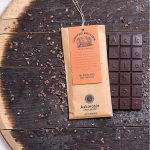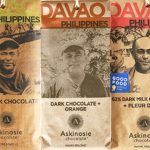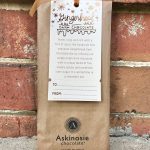Excerpt from Ari’s Top 5 enews
Good guy, Good Profit, great chocolate

Late last week, I got the first in what turned out to be a series of emails from someone who has done incredible work to make Good Profit a daily practice. When Shawn started his small chocolate business in Springfield, Missouri back in 2007, there were just a handful of bean-to-bar chocolate makers in the U.S. Today, I’m happy to report, there are hundreds. Shawn has led the way in making this good work happen. His contributions to the quality of the cacao, the quality of life of the farmers who grow it, his home community in Springfield, and, last but not least, the exceptional flavor of the finished chocolate are beyond remarkable!
Last week’s messages were about his current trip to visit the farmers from whom he buys cacao beans in Ecuador. Part of what has made Shawn’s work so impactful is his willingness to stick with things long past the initial glamor has gone. “I have been coming to Ecuador for 18 years. I’ve been every year except during the pandemic!” Vitaliano, who heads the farmer group in Ecuador, has done the same—he’s now 82 but still passionately engaged in the work. The collaboration between these two is what got Askinosie Chocolate started on the path to Good Profit and sustainable success. As Shawn reminded me the other day, “This was our very first bar.” Askinosie has been a staple on our chocolate shelves ever since.
Here’s what I shared about the Ecuador chocolate back when we first brought it in:
I’m not big on over the top superlatives, but, to my taste, this one is pretty spectacular. It’s got a cacao content of 70 percent, so it’s slightly less dark than the Mexican bar. The cacao it’s made from comes from the tiny, centuries-old Ecuadorian village of San Jose Del Tambo, which lies in the foothills of the Andes Mountains. I’ve yet to visit in person, but Shawn shared that, “At Del Tambo, the hills rise sharply until the tops are obscured by low-hanging clouds. The Rio de San Miguela, a fast-flowing river, along with just the right climate provides the land for some of the best cocoa in the world.” Note though that it’s not just the romance of the setting or the quality of soil that make the beans special—the beans it’s made from are primarily the Ariba varietal, known for the complexity of flavor it brings. The varietal is very well known in high-end chocolate circles, but almost unheard of anywhere else. The chocolate bar itself is really good—I’m impressed anew each time I taste it. Very well balanced, complex in flavor with a really nice, very lively finish. It’s creamy on the tongue without being over the top, lively without being out of control in any direction. It starts with a little bit of a high note, but then gets really wide and long; a touch tart but not too tart; a bit of a flavor note that reminds me of a big, dryish red wine.
What I’ve written about Good Profit has absolutely been an integral part of Shawn’s approach since the beginning. One of the first things he did when he started his business—almost unheard of at the time—was to return to the cacao-growing communities with finished chocolate for the farmers to taste the literal fruits of their long hours in the fields. Previously, growers had worked just as hard, but the industrial model had moved the profit and the decision-making power to places like Paris and Brussels. The circle of quality—where we assess our work in order to improve it—was broken. Bad Profit, naturally, ensued. Shawn reversed that flow, reconnecting the cacao growers with the impact of their work, and all these years later, the tasting and the tradition of it still matter. Shawn shared in his Ecuadorian email about Vitaliano last week, “We had a nice chocolate tasting. He and his family seem to really enjoy this and I could tell that they had missed it over the last four years [of the pandemic].” Another piece of bringing Good Profit to life was Shawn’s early decision to share Askinosie’s profits with the farmers. He carries financial statements with him (after having them translated into Spanish) to share with the farmers. In the process, the sort of eco-synergy I’ve written about above is actualized—the lives of Shawn, Vitaliano, and his fellow farmers; we as retailers and you as consumers; as well as the ecology of the land in Ecuador, are all enhanced. The chocolate that emerges from these caring collaborations is exceptional.
Like all well-made artisan foods, the flavor of the Ecuadorian cacao and the chocolate from which it’s made is a bit different from year to year. To me, this current crop of cacao has yielded a bar with delicious and delicate flavors, markedly cocoa-y, but still wonderfully gentle on the palate with nary a hint of bitterness. The finish has a bit of red fruit with maybe a touch of dark honey! You can find the bar at the Candy Store, coated with a layer of toasted Ecuadorian cocoa nibs. The Roadhouse has the plain, very excellent, Ecuador bar—without the nibs, you can really taste the delicate gentle fruitiness and cocoa of the chocolate. The Deli, Candy Store, and Roadhouse are all also stocking another Ecuadorian option: the same cacao crafted into a “milk chocolate” that uses coconut rather than cow’s milk, the result of which is a rare vegan “milk chocolate!” Allison Schraf at the Candy Store shared that the Ecuador bars are some of her biggest sellers!
The Askinosie Ecuador is awesome as a grilled chocolate sandwich on the Bakehouse’s sourdough. Or pop a square of it inside one of the marvelous dates from Rancho Meladuco—a world-class dessert assembled in under 60 seconds! Or eat some with a bit of Bakehouse baguette for a fantastic afternoon snack!



